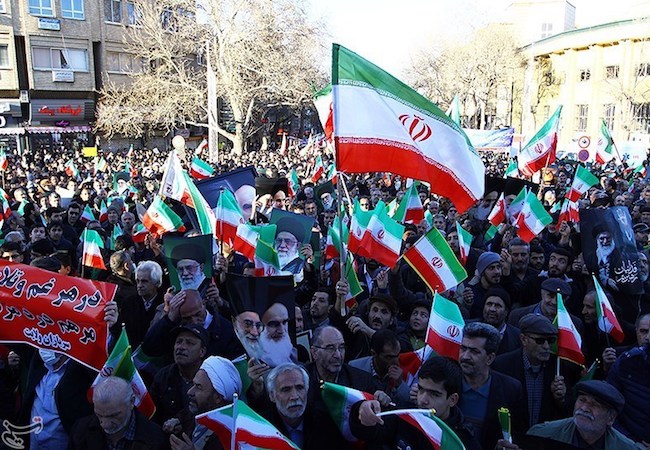
By Amma Younas
The protests which began in Iran are a reaction towards the increasing prices of fuel and food products, which is very common in many countries. All over the world, people protest against socio-economic policies of their governments like increase in taxes, unemployment etc. Same kind of protests should be expected in Iran especially after too many economic sanctions on it. Western media, like always, portraying an image that Iranian people have started a revolution against the current Iranian government and religious clergy.
Political demonstrations which lead to the violence including revolution can be compared with earthquakes. The tectonic plates under the earth surface are like social, political, economic and religious factors which can initiate big earthquakes of revolutions and civil wars.
Geologists say that if we keep facing small and low intensity earthquakes with a regular interval of time, we can avoid a big single earthquake which can be more devastating. Today, political scientists are also agreeing on this fact that states should allow small revolts, protests, public demonstrations and conflicts on the name of freedom of expression, human rights and liberties to avoid a big revolution or a civil war.
Same happened in the case of Arab spring. Although there are countless theories to explain it but the most convincing for me is “Earthquake Analogy” because it can explain what is happening now after 6 years. Middle East and North Africa is passing through the period which can be refereed as “Political Disaster Management” in comparison to “Natural Disaster Management” of earthquake.
Arab states had left no room for peaceful gatherings for individual freedoms, forcefully prohibited the small public protests and even brutally suppressed the frustrated populates demanding their rights. People got a spark and this spark burnt the whole government. The fuel for this uprising was prepared a long time ago and Facebook revolution was nothing but a spark.
Political scientists explain these events of Arab Spring in different categories of states vs states, people vs people and people vs states. But one thing cannot be neglected is the humiliation of people by the authorities which lead an ordinary citizen to actively participate in the uprising. Before the French Revolution, when people gathered in front of Tuileries Palace and protested for the bread shortage. Queen Marie Antoinette asked, “What are they demanding?” Someone said, “They are demanding bread.” Queen replied, “Let them eat cake”. It was humiliation for the people. People can bear with hunger but cannot bear with humiliation. In majority of the states, which suffered from the Arab spring, people were facing humiliation. This humiliation had no way out and in December 2010 someone had to set himself on fire to say that “enough is enough”.
After 6 years of Arab Spring, we can see that all the states (where people revolted against their governments), states are trying to accommodate people’s demands. People from all the fractions of societies are seeking accommodation in the state structure on the name of democratic government. States are becoming much more concerned about their international image and to fix their human rights records. Many states have tried to adopt very liberal, progressive and democratic constitutions and policies with considerable representation of youth and women in the parliament. Many authoritarian regimes seem to strive for economic stability and can be seen compromising even on their ideological preferences. Tunisia has adopted one of the finest constitution of the region. Overall, the reconstruction or disaster management of Arab Spring is going very well with exception in some parts. All the states in MENA region are striving to become more and more extravert and there is a common interest to stop violence and hatred in the region.
Geopolitically, in recent past, we have observed that sympathized policy towards Israel is being adopted by many states including its worst enemies like Egypt and Saudi Arabia. It might be because of outnumbering the foreign factor in domestic issues. Monarchies are concerned about painting a good image of their rule. The attitude towards US and Europe is also homogeneous. A cohesion can be observed among Muslim countries for the Palestinian cause. Western media outlets have a potential to amplify the incident and to set an international opinion. That’s what can be seen in the present case of Iran. Recent events like reaction against statements issued by Donald Trump, defeat of ISIS in Iraq and position of Muslim states for Palestinian cause after OIC meeting, have gone in the favor of Iran. Western political commentators and analysts are struggling to crystalize protests in Iran to set an international opinion that Iran is going towards another revolution.
In my opinion, the events in Iran are nothing more than ordinary street protests which are perfectly fine as they are small jolts of earthquake but very crucial to avoid a big earthquake. Iranian officials are trying not to humiliate the people by issuing responsible statements and trying to understand the gravity of the situation. Iranian government, alleged to run its proxies in the Middle East and North Africa should not be pursued as a weak government that cannot handle some public demonstrations inside its own country. Moreover, these public protests are providing a counter narrative to Western stance that Iran is an oppressive regime where human rights cannot flourish.




